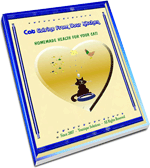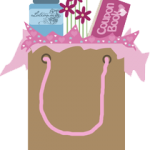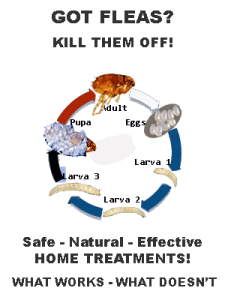Posts Tagged ‘how to kill fleas’
 Flea Season is Coming – Do You Know How to Kill Fleas Safely?
Flea Season is Coming – Do You Know How to Kill Fleas Safely?
Home Remedies for Fleas
Safe, Effective, Natural Fleas Treatment
FLEA SEASON is Coming –
What Flea Control Plan Do You Have to Get Rid of Fleas?
~
Here’s something everyone needs to know.
”Flea season” never really ends.
Fleas can be active year ’round.
Indoors and out.
Fleas treatment regimens can be necessary all ’round — whether you have cats, dogs or other pets — in warm or cold climates.
Most of us think that the colder temperatures lets us off the hook for flea control. We tell ourselves we don’t have to worry about how to kill fleas until it warms up again come spring.
 We may ease up on checking out that scratching, biting or licking we notice, thinking that our cat or dog has dry skin from winter dryness.
We may ease up on checking out that scratching, biting or licking we notice, thinking that our cat or dog has dry skin from winter dryness.
We may be a bit more lax on vacuuming and laundering pet areas and bedding. We breathe a sigh of relief that the cold weather has FINALLY killed off the blood-sucking beasties..and at least that gives us some reward for the humdrums of the winter cold.
Well…welcome to an unhappy reality.
Unfortunately, fleas are ultimate survivalists. The frigid temperatures of winter in the northern hemisphere usually kill off fleas outdoors…. but unless the temperatures hold at 37 degrees F or less for ten days, these little insect beasties can survive outside! If the weather stays that cold or lower beyond ten days, then all stages of the fleas will die. EXCEPT those that have found warmer accommodations to keep them ticking!
Being the survivalists they are, these despicable insect vampires have learned to find warm accommodations even outdoors that can help them live even in cold conditions. That’s why you will see poor lost, homeless and feral cats with nasty flea problems even in the cold of winter. Fleas seek out cozy shelters from the ravages of winter, finding warmer digs even outdoors. They snuggle up for a winter reprieve under decks, around foundations, in cracks, kennels and pet houses, bedding outdoors, garages, barns and on warm-blooded wildlife. Raccoon and opossum, for instance, can provide enough warmth and food to keep some adults going and carry eggs…that can brush off or be picked up by your cat or dog when taking a romp or snooze outdoors in the winter sun.
Raccoon and opossum, for instance, can provide enough warmth and food to keep some adults going and carry eggs…that can brush off or be picked up by your cat or dog when taking a romp or snooze outdoors in the winter sun.
Once they come into the warmth of your home by hitching a ride in…the fleas have it made. They continue their life cycle with plenty of accoutrement they need to lay more eggs or to emerge as hungry adults, who will now lay hundreds of more eggs to make you and your poor cats and dogs miserable. Not to mention that we, ourselves, can bring in this dastardly insect beast as we come and go in the yard and elsewhere. Visits to the vet, to other homes who may have pets and fleas…well…consider it an invitation to hitch a ride back on shoes, socks, clothes, jackets, bags — even hair — to your place.
FLEAS CAN STICK IT OUT – THEY CAN WAIT A LONG TIME BEFORE BITING FOR THAT TASTY MEAL
Adults that have newly emerged from the pupae can still last about one week or so without food from a host. However, if the completely developed adult fleas remain in their pupae, they can live for several months without their necessary blood repast.
When they sense the conditions are right — and a warm blooded host ambles near — they emerge quickly from their cozy cocoons, write their own invitation — and take them on for dinner!
Granted, fewer fleas survive in the cold winter months and we may be relieved of all out infestations. That’s what lulls many into thinking that fleas ‘go dormant’ in cold temperatures. If they haven’t been killed off, and conditions aren’t ideal for them to emerge and take a meal, fleas cozy up in their pupae fortresses and wait it out. But it only takes ONE miserable flea to do damage, bite, lay eggs and start the cycle of war all over again. 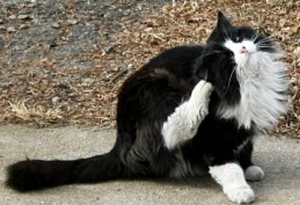
One or two fleas IS a Big Deal..since they multiply and develop so rapidly once conditions meet their needs. Meanwhile, they wait it all out — hiding and lurking everywhere.
Once the weather warms up and others creep out of their winter hold ups…a full-fledged household-wide infestation can develop almost overnight. As soon as a warm body comes within their extensive range, they pop out and go for the blood — like the little vampires they are. They are hungry and ready to take advantage of their first victim! After a good meal, eggs are laid. Any shortly thereafter, they start to hatch.
Fleas tackled in the colder months eliminate adults that can lay more eggs indoors and prevent an infestation that will have you pulling out your teeth and hair.
Indoors – in our homes – cat fleas hide and develop regardless of the snow and ice blowing outside. Fleas thrive on our comfy hospitality while dining on our pets and us. They mate, produce eggs, larvae, pupae and then adults emerge…hungry and looking voraciously for their first bite out on the ‘town. And then more eggs, and more stages of the life cycle are falling all over the house, hiding themselves to emerge later as adults, who eat by biting, causing misery and often severe allergic reactions to poor cat and dogs they victimize.
Flea adults, eggs, larvae and pupae – the four stages of the flea life cycle — find convenient places to live and thrive in on our cats and pets as well as our carpets, upholstery, crevices, nooks and crannies, draperies, rugs, floor cracks and floor board grooves for starters. 
Pet bedding and the areas around which our cats and dogs recline and spend time are prime areas for flea larvae and pupae to take refuge. The eggs fall off our cats and pets and they find plenty of food nestled in the area. They dine easily on debris dropped from our daily living and from our animals and go about evolving to become one of the most miserable creatures we can find to deal with when it comes to our cats, dogs and other pets…and our own skin!
That’s why vacuuming is so vital. It sucks up not only the adults that are caught, but also some larvae, eggs and pupae, although they can be sticky and difficult to vacuum up…but it destroys their food supply and helps to starve them out before they hatch. And the vibrations of vacuuming also encourages adult fleas – lying in wait in their protective, cozy pupae – to emerge. They are easier to suck up in the regular vacuuming and are more vulnerable then than the other stages to other treatments we smartly applied to the carpets and other areas to get them.
DON’T GO INSANE & RESORT TO CHEMICALS – THERE IS GOOD NEWS! T hings can get so bad that people get overwhelmed and desperate, resorting sometimes mindlessly to any number of toxic chemical solutions that can harm us, our families and our cats, dogs and pets. And the environment – for years to come. And many overdo it, leaving sad stories of irreparable harm to pets and sometimes other family members as well as themselves.
hings can get so bad that people get overwhelmed and desperate, resorting sometimes mindlessly to any number of toxic chemical solutions that can harm us, our families and our cats, dogs and pets. And the environment – for years to come. And many overdo it, leaving sad stories of irreparable harm to pets and sometimes other family members as well as themselves.
You may feel like you’re going insane from the stress and constant battle.- But HOLD your Desperation! There ARE far safer, natural means — and less expensive as well — to conquer this blood sucking insect beast.
It can take more work than a simple chemical…but these fleas-busting techniques are things we normally do or should do anyway. And others are inexpensive additions that won’t make us lie awake at night, worrying whether we have poisoned our family, pets and environment with known and unknown repercussions into the future.
Chemical applications don’t kill fleas off for good, either. They are NOT the be all – end all! And can create problems that last!
If you haven’t addressed fleas in the house and in the yard – in at least two to three of their life stages AT the SAME TIME — more work is still needed to keep at the flea war – especially once they have gained a hold and an advantage of numbers.
With ideal weather conditions for fleas such as we’ve seen in the past few years- flea outbreaks can get well out of hand once the first one, two or few have established themselves. You may keep floors you can eat off from — and pets combed to perfection — but if one flea escapes notice and is not treated, the war begins again.
Remember — ONE flea you can SEE…means dozens of others in the neighborhood! All developing into biting, eating machines!
Consistent diligence year round is important. Especially now, since many of the oh-so-popular and now so feared spot on applications no longer work to kill fleas, but continue to cause suspicious reactions in too many pets. Fleas mutate to overcome the killing effects of these poisons, which leads to different, perhaps even more toxic formulas, more toxic reactions possible, and on and on.
DON’T give up! You NEEDN’T cave in to desperate tactics with poisonous flea bombs that so many still continue to advocate, toxic pesticides applied to your cats, dogs and pets, and other harmful shampoos, sprays, flea collars, dusting powders and even some natural essential oils that can be totally lethal for cats!
The GOOD NEWS! You CAN Defeat the Flea Foe — Sanely and Safely!!
- Know your enemy. Hit them at their weakest points of their growth cycle – all at once.
- Indoors and Out.
- Protect your cats and pets from further attacks with regular household cleanings, combings and the use of safe repellants.
- Keep watch for ANY scratching — and if you see it…investigate! If its fleas – TAKE ACTION NOW! It may Not be fleas, but something that needs a look by your vet in any case.
USE SAFER HOME REMEDIES TO KILL FLEAS – THEY WORK WITHOUT THE WORRY!
Simple, more natural means of getting rid of fleas in the house and environment, indoors and out, attack susceptibilities of fleas that they cannot evolve from.
For example, (FOOD GRADE – ONLY!) diatomaceous earth, 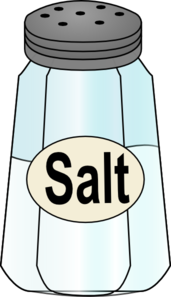 salt or borax (used carefully of course) all dry out various stages of fleas and also taint their food supply. With careful applications, they are safe for your family and for your cats and other pets.
salt or borax (used carefully of course) all dry out various stages of fleas and also taint their food supply. With careful applications, they are safe for your family and for your cats and other pets.
Laundering and vacuuming are safe, natural home remedies for flea control and except for those who dislike the sound of vacuums…they are godsends in our arsenal of fleas treatment weapons to battle the tenacious flea.
Other simple flea killing and repelling techniques are available to eliminate the idea that chemicals are necessary to defeat the flea foe. Nitenpyram, the generic form of “Capstar” is a safer, quick way to kill off most adult fleas that are attacking your cat within 30 minutes. It lasts 24 hours and passes out of the system. Meanwhile you have spared your cat much misery, avoided spot-on applications of toxins on your cat, and it buys you time to clean up fleas in the environment and take control. Nitenpyram can safely be given daily if needed, but obviously, spare your cat that by going to battle on adults and other flea form stages in the household and yard with other external, safe flea treatment applications.
Use of Insect Growth Regulators is a less toxic means of interrupting the flea life cycle than flea bombs, sprays and other pesticides that can coat and linger everything in sight in the household when used. IGRs stop flea eggs from hatching. The adults will still bite, so they need to be tended to with proper, safe flea killing applications, but any eggs they lay that fall off into the carpet and household and outdoors, will not hatch.
So it is now likely easy to see that the flea is a difficult foe…but not an impossible one to defeat.
Here’s What to Do to Get Rid of Fleas in the House and Yard
![]() Go after all the four stages of development at the SAME TIME–-Inside and Outside (when the weather is warm and dry enough to treat the yard)
Go after all the four stages of development at the SAME TIME–-Inside and Outside (when the weather is warm and dry enough to treat the yard)
- Killing off two or three stages will do the trick usually. (Pupae are hard to eliminate…but you can deprive the newly emerged adults of food and dry them out with the dusts below. )
![]() Kill fleas indoors with FOOD GRADE Diatomaceous Earth, Borax, Salt or combinations of the three to kill different stages of the flea monster.
Kill fleas indoors with FOOD GRADE Diatomaceous Earth, Borax, Salt or combinations of the three to kill different stages of the flea monster.
- Hit the cracks and crevices, nooks and crannies, seat cushions, under chairs and furniture, corners.
- Treat carpets and rugs, under beds and chests.
- Treat any and all places fleas will easily hide, fall into and grow.
- Use them in the home environment and (FOOD GRADE ONLY) DE on your cats and bedding as well.
![]() Kill fleas with the vacuum and the wash machine — using them regularly.
Kill fleas with the vacuum and the wash machine — using them regularly.
- If you have an infestation – intensify your schedule and vacuum every day if necessary.
![]() PRESSURIZED Steam cleaning can kill fleas. Non-pressure machines can make things worse. (fleas need some humidity to thrive)
PRESSURIZED Steam cleaning can kill fleas. Non-pressure machines can make things worse. (fleas need some humidity to thrive)
![]() Cat Bath – IF your cat is infested. (Otherwise spare the chaos and emotional upheaval. Use other safe products to get rid of fleas)
Cat Bath – IF your cat is infested. (Otherwise spare the chaos and emotional upheaval. Use other safe products to get rid of fleas)
- Use a mild dish washing soap. (to spare your cat’s skin) Any brand will do. Soap breaks the surface tension to help drown the fleas by preventing them from crawling out of the water. Use soap too in your disposal container when flea combing your cats to keep them below the water surface.
![]() Use Nitenpyram (“Capstar”) capsules to kill adult fleas quickly, effectively and safely if needed.
Use Nitenpyram (“Capstar”) capsules to kill adult fleas quickly, effectively and safely if needed.
————–
![]() OUTSIDE- Use FOOD GRADE DE (Do NOT use Borax or Salt – will kill plants)
OUTSIDE- Use FOOD GRADE DE (Do NOT use Borax or Salt – will kill plants)
- Dust pet lounging areas, cat and dog houses, outdoor bedding, around the house foundation and perimeter, under porches and decks and apply it to your cats before they exit house
- Do NOT apply to areas where you have beneficial bugs…it can kill them as well.
![]() Keep the yard mowed to allow the sun to reach the soil and make it too hot for fleas
Keep the yard mowed to allow the sun to reach the soil and make it too hot for fleas
![]() Keep the yard watered to kill fleas by drowning them.
Keep the yard watered to kill fleas by drowning them.
Then…once cats, dogs, pets, home and yard are treated…you need to keep at it.
You may have to repeat these practices if an infestation has taken hold – and be consistent and diligent in all areas — cat, house, yard.
![]() Use Safe flea repellants regularly in the environment and on your cat
Use Safe flea repellants regularly in the environment and on your cat
- Do NOT use DOG products on your cats! Some ingredients may NOT be tolerated by a cat’s system and cause harm or death!
- And be VERY careful of ANY essential oils…even in shampoos and deterrents. They can be LETHAL to a cat! Even though ‘touted’ as ‘safe’.
![]() You can also use an IGR (insect growth regulator – also known as IDI — insect development inhibitor–) around the house (and some are formulated for on-cat use
You can also use an IGR (insect growth regulator – also known as IDI — insect development inhibitor–) around the house (and some are formulated for on-cat use
- Prevents any eggs that may be on your cat or in household from hatching.
- Does NOT kill adults. They will continue to bite and bring misery- but life cycle is broken at the egg. (Use safe adulticides simultaneously to kill off the adults!)
I use Siphotrol Plus Spray in the household here at the sanctuary – with EVERY precaution. Even though deemed safe, it is used no more than needed and given more than the suggested time to thoroughly dry before anyone of any species is allowed into the area.
Deemed ‘safe’ – and my research prior to use seems to indicate no safety issues thus far. So far – no problems and it has helped. Too many ‘safe’ applications have proven otherwise. IGR data seems solid, but I remain vigilant and use nothing more than absolutely needed.
SAFE – NATURAL FLEA CONTROL – WAYS TO GET RID OF FLEAS IN THE HOUSE AND YARD – -THAT WORK!
Using more natural flea killing alternatives to defeat fleas, our cats and pets end up far healthier. We and our families aren’t exposed to more dangerous toxins, and it all comes along with a thanks from mother nature for sparing further harm to her well being and all other creatures, present and future, which are dependent on her healthy state as well.
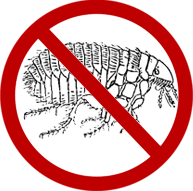 Get YOUR natural flea treatment battle plan in place before the warmer temperatures make conditions more ideal for ‘the enemy’ to feed and breed and produce the first flea battalions . Discover how to prevent these unwanted ‘guests’ in your home — and if you find any crashing your hospitality – know how to be prepared and how to take quick action to cut them off at the pass!
Get YOUR natural flea treatment battle plan in place before the warmer temperatures make conditions more ideal for ‘the enemy’ to feed and breed and produce the first flea battalions . Discover how to prevent these unwanted ‘guests’ in your home — and if you find any crashing your hospitality – know how to be prepared and how to take quick action to cut them off at the pass!
For safer, natural flea treatments – simply click here to learn how YOU can effectively and safely fight the foe — with home remedies for fleas — before they even start the battle!
If your cats have fleas – then DO check them for Tapeworms as well. It’s almost a given, since fleas carry tapeworms.
For additional information on Tapeworms treatments, see my “RELATED POSTS” at the very bottom of this article – above the Comments Area!

